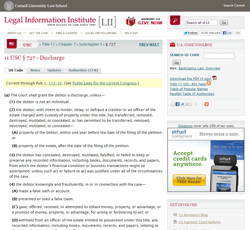In this second installment of our series “Basics of Bankruptcy,” we discuss reasons to file a Chapter 13 bankruptcy rather than the less complex Chapter 7 bankruptcy.
WHY FILE CHAPTER 13 ANYWAY?
When considering to file bankruptcy, the first decision that probably should be made is whether you should file either a Chapter 7 or Chapter 13 bankruptcy. There are several reasons why a debtor should (or must) file a Chapter 13 bankruptcy, including (but not necessarily limited to):
- Not eligible for a Chapter 7 discharge
- Above-Median debtor
- Debtor does not want to liquidate assets
- Curing a mortgage
- Cramming a mortgage
- Stripping
- Cramming a car
- Cramming other personal property
- Lowering interest rates on cars (and other collateral)
- Liquidating tax debts
- Protecting a co-debtor
In this post, we will look at the first three reasons above to choose Chapter 13. The remaining reasons will be covered in parts 2-4 of this series.
Not Eligible for a Chapter 7 Discharge.
Summary: A person cannot file for Chapter 7 bankruptcy within eight year of previously filing for Chapter 7 or Chapter 11, or within six years of filing for Chapter 12 or Chapter 13 protection.

Pursuant to US Code, Title 11, Chapter 7, Subchapter II, Section 727(a)(8)*, you (the debtor) are not eligible for a Chapter 7 discharge if you were granted a discharge in a Chapter 7 or Chapter 11 bankruptcy in a case that began within eight years before the date of the new bankruptcy filing.
Further, Section 727(a)(9) states that the debtor will not be eligible for a Chapter 7 discharge if the debtor was granted a discharge in a Chapter 12 or Chapter 13 bankruptcy filed within six years of the new filing (unless the plan payments paid 100% of allowable claims or paid 70% of such claims and the plan was proposed in good faith and was the debtor’s best effort).
Thus, an individual who received a discharge in a Chapter 7 bankruptcy six years prior would either have to wait two more years or file a Chapter 13 bankruptcy.
Above-Median Debtor
Summary: The court may dismiss an individual consumer debtor’s case filed under Chapter 7 if the debtor’s household income is greater than the median income for a household of the same size.
Filing Chapter 7 would create abuse.
Pursuant to Section 707(b)*, the court may dismiss an individual consumer debtor’s case filed under Chapter 7 if it finds that the granting of relief would be an abuse of the provisions of Chapter 7.
- If the debtor’s household income is greater than the median income for a household of the same size, then the court shall presume abuse exists if current monthly income minus the means test standardized expenses leaves at least $182.50/mo (or $10,950.00 for 60 months).
- If the net result is greater than $109.58/mo ($6,575.00 for 60 months), but less than the $182.50 figure, then there shall be a presumption of abuse if the net figure times sixty is at least 25% of the debtor’s general unsecured debts. In other words, if the debtor has incurred large amounts of debt, then the debtor may actually be more likely to get a discharge in a Chapter 7.
- The presumption of abuse may only be rebutted by demonstrating special circumstances “such as a serious medical condition or a call or order to active duty in the Armed Forces, to the extent such special circumstances that justify additional expenses or adjustments of current monthly income for which there is no reasonable alternative” [See Section 707(b)(2)(B)(i)].
Debtor does not want to Liquidate Assets
Summary: Debtor may protect those assets that they do not want to have liquidated by filing for Chapter 13 bankruptcy protection rather than Chapter 7.
Under a Chapter 7 bankruptcy, the duty of the trustee is to “collect and reduce to money, the property of the estate for which the trustee serves” [Section 704(a)*].
If, after utilizing all applicable exemptions for your client, there remains an asset that may be properly liquidated and your client desires to retain such assets, your client may protect those assets by filing for Chapter 13 bankruptcy protection.
As stated in Section 1325(a)(4)*, the court shall confirm a plan if the value of property to be distributed under the plan is not less than the amount that would be paid on such claim if the estate of the debtor were liquidated under Chapter 7 of this title.
In our next post, we will discuss mortgage curing, cramming, and stripping, methods employed to help reduce debt.
* Source: Cornell University Law School Legal Information Institute
